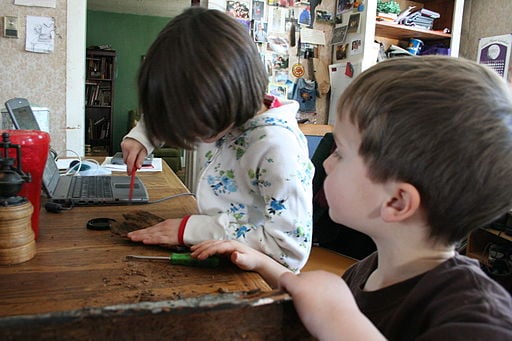“Ezra, explain to me what’s going on with you and Zach lately. Why are you wailing on him all the time?” I asked in the car today.
“Because I like it. He annoys me and it’s fun.”
“But it’s not right.”
“But I like it.”
Which is, of course, the problem. Virtue has so little to commend it when compared to the hedonistic pleasure of pulling someone’s strings and watching him dance.
Virtue. What an old-fashioned word. It sounds anachronistic. “What’s that word doing in the 21st century?” you might ask.
I’ve been thinking about virtue lately because we’ve been studying the American Revolution. You can’t read Benjamin Franklin or Thomas Jefferson without thinking about virtue. You can’t learn about the lives of John Adams or Phillis Wheatley without thinking about virtue, and not just because they used the word. Their lives, complicated and broken no less than our own, exhibited a strength of character rarely aspired to, let alone achieved, in the modern era. Even as I struggle to make sense of their positions on slavery, I am awed by them.
As I talked to my friend Jen about these early American leaders, I was struck by the magnitude of all they had done. In some ways, it’s hard for my mind to conceive that humankind is capable of what they accomplished. When I asked how it was possible, Jen, a history major, said that it was because of how they were educated. That intrigued me, and I asked her what she meant. “They read the classics,” was her answer.
And I think she’s at least partly right. There was a time when the great thinkers and writers spent their lives trying to understand what it meant to live a virtuous life. The life of a reality TV star would be inconceivable to these men and women. And it’s not just because much that happens in TV-inspired lives is depraved; it’s that the shows, and those of us who watch them, celebrate the depravity.
Another aspect of studying the classics that occurred to me as I talked to Jen was that Washington and his peers were not studying the classics so that they could get into Harvard. Washington, after all, went to college only to get a surveyor’s certificate. These men were lawyers and farmers and inventors. Phillis Wheatley was a slave and a poet. They studied the classics, including the Bible, to learn how to live well in the midst of their circumstances.
In this way, their education was not only different from today’s reality TV stars, but different as well from nearly all of the wealthy children attending Phillips Exeter. The education of early Americans may have looked like many modern homeschools in some ways, but in too many the goal of homeschooling parents is no different from anybody else’s: admission to “top tier” schools where their children can pursue their dreams rather than the common good.
What happened, I wonder, to virtue?
What if virtue is the proper goal of education? I think that it may be, and from time to time I remember that. (See yesterday’s post for an example.) But all too often I forget. What do I need to change about how we homeschool and live in order to raise virtuous children? What do I need to change about myself?
Last week, I wrote that I have been experiencing a sense of mourning at the smallness of my life. Part of that sadness, I believe, has come from studying the lives of early Americans. Learning more about them, I am aware of how often I have pursued importance over virtue. I can’t teach algebra to the boys if I don’t know how to multiply. And there is no point in hoping my children will pursue virtue if I’m not doing likewise.
But I am not without hope.
I rarely quote the Bible in my blog – so many of my friends and family are not into Jesus that it doesn’t seem helpful. But when I cling to a specific passage as a source of hope, it seems dishonest not to quote it. So here it is, the words of Paul, encouraging me toward virtue and hope in a world that often seems to encourage despair and then offers a variety of anesthetics to numb that despair. I can imagine writing this letter to the boys, and I like imagining Jesus writing it to me.
Philippians 1:3-11 (From The Message Bible, a modern poetic interpretation of the Bible by Eugene Peterson)
Every time you cross my mind, I break out in exclamations of thanks to God. Each exclamation is a trigger to prayer. I find myself praying for you with a glad heart. I am so pleased that you have continued on in this with us, believing and proclaiming God’s Message, from the day you heard it right up to the present. There has never been the slightest doubt in my mind that the God who started this great work in you would keep at it and bring it to a flourishing finish on the very day Christ Jesus appears.
It’s not at all fanciful for me to think this way about you. My prayers and hopes have deep roots in reality. You have, after all, stuck with me all the way from the time I was thrown in jail, put on trial, and came out of it in one piece. All along you have experienced with me the most generous help from God. He knows how much I love and miss you these days. Sometimes I think I feel as strongly about you as Christ does!
So this is my prayer: that your love will flourish and that you will not only love much but well. Learn to love appropriately. You need to use your head and test your feelings so that your love is sincere and intelligent, not sentimental gush. Live a lover’s life, circumspect and exemplary, a life Jesus will be proud of: bountiful in fruits from the soul, making Jesus Christ attractive to all, getting everyone involved in the glory and praise of God.
To which I say, Amen!











